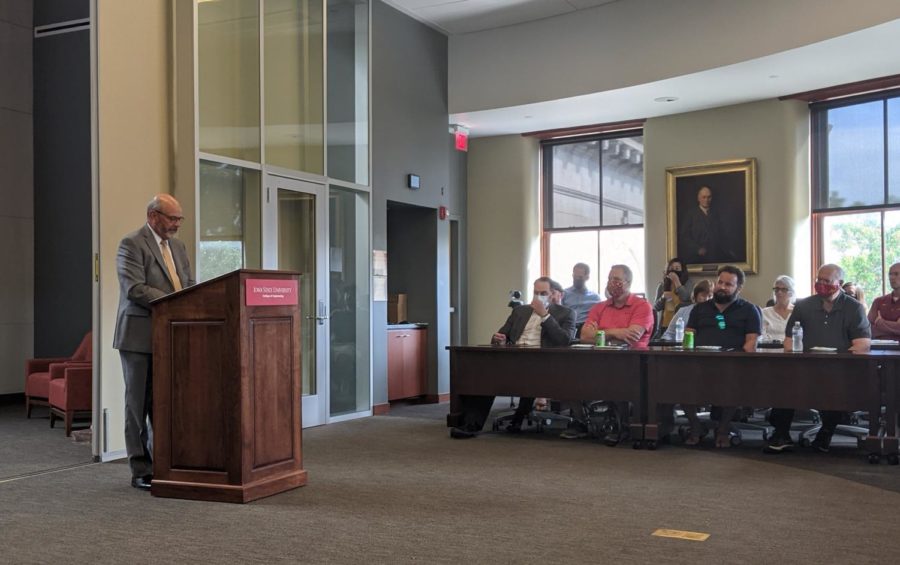College of Engineering celebrates research success, grossing over 50 million dollars in external funding
College of Engineering Dean W. Samuel Easterling shares moments of fellowship and celebration during a ceremony held Tuesday in Marston Hall.
September 1, 2021
Iowa State’s College of Engineering hosted a celebration Tuesday afternoon in Marston Hall, honoring the success of various research projects of the college and larger University.
As the semester kicked off the Dean of the College Engineering, W. Samuel Easterling, wanted to share some moments of fellowship and celebration to commemorate the endeavors being taken by ISU researchers.
At the event, Easterling spoke on the many efforts being made by ISU researchers and highlighted some outstanding successes stemming from the College of Engineering.
“We’ve launched several major research project initiatives to take on big important problems all of this really in the last couple of months we’ve had a lot of concentrated efforts to the tune of about 50 million dollars total, which is just incredible,” said Easterling. “The Iowa State College of Engineering is working hard on discoveries that impact the local communities the national community and in many cases the world, so we couldn’t be prouder of the work they’re doing to make this a better place for us all.”
The dean highlighted several projects that researchers from the College of Engineering have taken on, tackling issues from rural broadband access to the development of antibiotic bacteria in livestock manure management systems. One program highlighted was a research project on integrating AI and machine learning into farming practices.
“This summer we announced that our college is now going to a 20 million dollar national AI research institute,” said Easterling. “The AI Institute for Resilient Agriculture really (AIIRA) exemplifies the convergence of two things we’re very good at here at Iowa State, the harnessing the potential of artificial intelligence and of course pioneering new approaches to agriculture,”
Baskar Ganapathysubramanian is the Principal Investigator and Director for the AIIRA, as well as a professor of mechanical and computer engineering at Iowa State. He explained the focus of his current project.
“So the focus we have is to integrate some machine learning and robotics (into farming practices),” said Ganapathysubramanian. “To train the next generation of agronomists who are AI aware; to train the next generation of engineers and scientists who can contribute to agriculture and along the way come up with new technologies so our farmers can be more profitable, and more sustainable.”
Ganapathysubramanian and his team are well aware that increases in climate change means less hospitable conditions for growing crops, especially in the Midwest. Their research hopes to streamline agricultural processes to reduce waste and environmental strains.
“What we now do is we fly a drone over large fields and take images, then the images can be understood by an AI agent and identify where the Hotspot for diseases are,” said Ganapathysubramanian. “Instead of a farmer going and missing spots, now this is going to very quickly and very repeatedly go and check for hotspots and help within terms of speed and economics.”
Another research project helping to converge agriculture and technology is being led by Soumik Sakar, an assistant professor of mechanical engineering at ISU.
“I’m leading is a national science foundation cyber-physical systems project, this project is about building a cyber-agricultural system to essentially have a more sustainable agricultural practice,” said Sakar.
Sakar’s project aims to replace bulkily tractors with smaller, more precise robots which can monitor and manage crops efficiently. These practices, applied correctly, could help to reduce the amounts of chemicals running off into tributaries and wastes of water.
Iowa State isn’t the only university involved in this project, while ISU’s leading the project, Ohio State University, George Mason University and even the University of Illinois with their advanced robotics program are all involved in this research.
“So they (University of Illinois’ robotics) are also building robots to actually do this local spraying or local chemical injection.” Sakar continued “They have this soft robotics or textureless robotics, the soft arms can go and inspect a plant just like a human farm scout can and look for diseases and insects.”
These advanced machines, combined with machine learning and AI systems could replace scouts and laborers, allowing farmers to automate the maintenance of their crops.
Research projects like these offer chances to use the most modern technology and scientific knowledge in a variety of practices. Improving and streamlining important practices like farming and agronomy helps to ensure that people will be able to cope with the intensifying ecological issues of the modern age.







